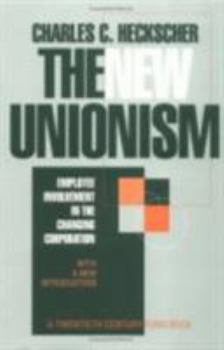The New Unionism: Employee Involvement in the Changing Corporation with a New Introduction
Select Format
Select Condition 
Book Overview
In his visionary analysis, Charles Heckscher argues for associational unionism, a model outside the tradition of American labor law. Rejecting the usual boundary between workers and management, Heckscher defines a genuinely new system of representation that encourages multilateral negotiation involving management, different groups of employees, and other interested parties, such as consumers or environmentalists. The New Unionism, a Twentieth...
Format:Paperback
Language:English
ISBN:0801483573
ISBN13:9780801483578
Release Date:October 1996
Publisher:ILR Press
Length:360 Pages
Weight:1.08 lbs.
Dimensions:0.8" x 6.1" x 9.1"
Age Range:18 years and up
Grade Range:Postsecondary and higher
Related Subjects
Business Business & Investing Economics Political Science Politics & Social SciencesCustomer Reviews
2 ratings
what unionism should be about
Published by Thriftbooks.com User , 18 years ago
This book describes what trade unions would be if most union leaders would wake up and realize what century they're living in. They might, for example, take notice of the rise of the service sector and the decline of manufacturing - something that big union federations like the AFL-CIO have generally been pretty oblivious to (despite the valiant efforts of individual unions like the Service Employees International Union), even though ignoring this trend has meant such a big decline in unionization rates in the last 30 years. They might also notice that, at least rhetorically, the atmosphere in industrial relations is increasingly characterized by participation, involvement, and partnership, rather than confrontation, and get on board where management is sincere about these changes, while intelligently challenging management to live up to its rhetoric where it is not sincere. (To be fair, the role of the Wagner Act in perpetuating the confrontational approach should not be overlooked, as this book points out. However, rather than sticking to the Wagner Act paradigm, unionists could fight for legislative changes that would help bring about the appropriate paradigm shift.) And then they might think about what being a membership-based organization means in the 21st century. Which might make them start to think about how to serve not only currently employed members but also those who have been adversely affected by industrial restructuring and lost their jobs (e.g., helping them adjust to changes in the labor market by getting them new training, organizing employment services to find them new, satisfying jobs, by helping them with moves, etc.). There's no end to the useful ideas that might come out of such a line of thinking. ... But I'm afraid it's probably all just a pipe dream. I'm sure union leaders will continue to stick with the status quo and sit comfortably in their cosy sinecures, responding to the changes currently affecting work and work life by lobbying politicians for protectionist legislation instead of rising to the challenges - and taking advantage of the opportunities - presented by globalization.
A must read for all union officers and HR managers.
Published by Thriftbooks.com User , 25 years ago
Where the players are the adversaries of corporations and organized labor, Professor Charles C. Heckscher provides insight from a not so distant perspective, describing in clear and concise language what went wrong and how to fix it in a non-adversarial system.This book is divided into three parts: Part I deals with the rise and fall of the Wagner Act framework, which offers a short history of its creation for the purpose of providing a balance of power between the players, but how that balance no longer exists in a global economy, where the ultimate weapon of a strike is barely felt by a huge corporation; then Part II explores new forms of organizing and representation including community coalitions, quality of work life programs, labor-management committees, and the need for representation of all employees, to include middle managers and semi-professionals; andPart III describes what is required to build a new system utilizing the three elements of representation. Throughout this book Heckscher builds on the concept of what he calls "managerialism" and "associational unionisim." He describes how the use of communication can be a far more pervasive weapon than the strike. He describes how the courts are too costly for the average worker to utilize as a tool for representation but how an association of workers can utilize the courts. He discusses how labor laws are affected by court rulings and how the courts and laws can be a help or a hindrance. How the interests of labor have become fragmented into the interest of specific groups, such as women groups, civil rights, environmental, and disability groups, and the importance bringing these groups together at the same negotiating table with the employer.The book is well written in a modular format making the complex issues much simpler to understand and absorb. Heckscher writes in a nonjudgmental tone which is sometimes humorous but always enlightening.I'd recommend this book as a reference tool for all union officers, business agents, and all human resource managers. If you are a steward with a desire to eventually become a union BA or company HR, or if you are a supervisor who is insecure about this new "semi-autonomous team" rhetoric coming from your boss, you too should read this book. If you want to strengthen your union, if you want to increase employee commitment, if you want to create or strengthen a community coalition that supports both labor and business, you should read this book. And finally, if you are at all confused or frustrated by the current adversarial labor-management relationships and what other options may exist to alleviate the problems you have with your members or with your employees (assuming you're a HR person), then this is the book for you.






